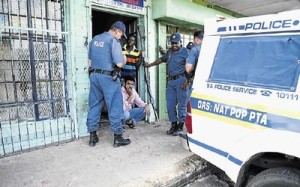Searching for roots of xenophobic attacks
This article below was published by BDlive:
By: Khulekani Magubane, 30 January 2015, 05:57

Nazil Munssi, surrounded by police, in front of his looted shop on Friday. Townships including Soweto have been hit by looters targeting foreign-owned stores. Picture: AFP/STEFAN HEUNIS
THE government was caught off guard by this month’s violent attacks against foreign shop owners, pointing to a political failure rather than an intelligence failure, says former intelligence minister Ronnie Kasrils.
His comments came as the lobby group Right2Know blamed a “sustained failure of SA’s intelligence services over a long period of time” for the looting of spaza shops that spread from Soweto after the alleged shooting of a youth by a Somali shop-owner. This has resulted in the death of five people.
As the authorities grapple with how to deal with the threat against foreign shop owners in township areas, Right2Know said it was “particularly disappointed by the response of the government in denying that the attacks on foreign nationals constitute xenophobia, when it is as clear as day that they do”.
Arguing that SA’s intelligence work was far too secretive, Right2Know urged the Cabinet to release its annual national intelligence priorities, saying these should be debated in public, to allow SA to assess what the state considers threats to national security, and if these actually exist.
However, Mr Kasrils said yesterday the recent attacks against foreigners could only be blamed on political failure, as the state had not learnt anything from the more serious attacks against foreigners in 2008 and subsequent recommendations to avoid a repeat.
“The question is what has government been doing since 2008? If those recommendations were put in place… I believe the causes should have been addressed and we would have been in a better position,” said Mr Kasrils, who resigned from the African National Congress last year. He is now a leading member of the United Front, an opposition movement associated with the National Union of Metal Workers of SA.
Right2Know member Jane Duncan said the government’s denial of xenophobia, compounded by weaknesses in national intelligence systems, had led the authorities to implement suppressive solutions to social unrest rather than social solutions, often with little success.
“I’m very disappointed by government denial and (its saying) that (these attacks) are criminality and not necessarily xenophobia. If you think back to 2008, Thabo Mbeki refused to see those attacks as xenophobic,” Prof Duncan said.
Ironically, after the 2008 attacks the role of the intelligence services also came under the spotlight, with Mr Kasrils saying at the time that the focus of the intelligence services needed to be on the “trigger points”, not the “all-embracing socioeconomic climate in the country”.
Senior researcher at the Institute for Security Studies Johan Burger did not agree that the violence could be squarely blamed on a failure in intelligence.
“I’m not certain if it’s an intelligence failure. That would assume that there was prior indications that this would happen. We knew that they were there in 2008 but they were not acted upon,” Dr Burger said.
Spokesman for the State Security Agency Brian Dube denied that attacks against foreigners were able to spread because of an intelligence failure. “We certainly do not believe what they are saying. We continue to work in the security cluster to ensure safety in this country. But we would rather not want to engage in a public debate,” Mr Dube said.
African Centre for Migration and Society researcher Loren Landau said denying that violence affected foreigners and labelling it random suggested a “conscious blindness” to the causes of unrest in townships.


